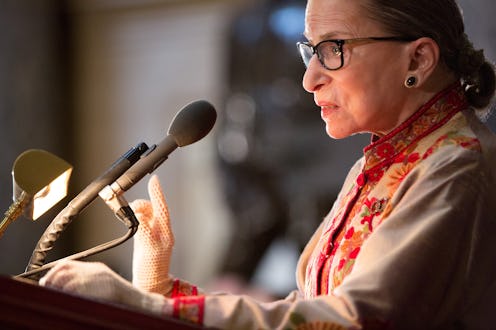News
RBG Challenges Abortion Case Like Only She Can
While the Supreme Court heard arguments for the case of Whole Women's Health v. Hellerstedt on Wednesday, Justice Ruth Bader Ginsburg called into question the reasoning behind limiting the number of abortion clinics in Texas. A 2013 law passed in Texas looks to result in the closing of 34 of the state's 40 clinics which provide abortions. That law requires abortion clinics to meet the requirements of what are called "ambulatory surgical centers," and RBG is having none of that. According to the official transcript, she challenged: "What is the benefit of the medical — the two pills that you take — what is the benefit of having an ambulatory surgical center to take two pills when there's no ... surgical procedure at all involved?"
Ginsburg was referring to medical abortions, which are completed by ingesting pills, as opposed to the more invasive procedures. Why would a clinic providing this type of abortion be required to meet the standards of a surgical center? According to Think Progress, to qualify as ambulatory surgical centers, many of Texas' clinics would have to undertake numerous expensive renovations, including widening hallways and installing special air filtration systems. Scott Keller, Texas Solicitor General, responded to RBG's question: "[T]he complication rates are greater. When there's a complication ... from a drug-induced abortion, then a surgical abortion is needed as a follow-up."
Ginsburg was not appeased by this response, saying, "[T]hat complication is likely to arise near the women's home ... which the 30 miles has nothing to do with." She was referring to another provision of the 2013 law, which requires that abortion providers be able to admit patients to a hospital within 30 miles of the clinic where the abortion takes place.
Mr. Keller pointed out that most abortions in the state are surgical. But even in the case of non-medical abortions, Time reported that the logic is called into question, because abortion is considered a procedure, not a surgery, by some critics of this requirement. But Ginsburg was focusing on the absurdity of the fact that the Texas law disallows physicians from providing even medical abortion outside an ambulatory surgical center.
The Supreme Court is one judge short after the unexpected death of Justice Antonin Scalia in February, leaving only eight judges and setting up the possibility of a tie. If the court is split down the middle on Whole Women's Health v. Hellerstedt, then the lower court's decision to uphold the law will remain, and similar laws could crop up all over the nation. Ginsburg, for her part, is doing what she can to resist that outcome.
